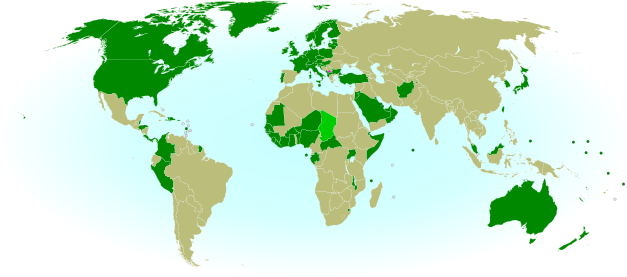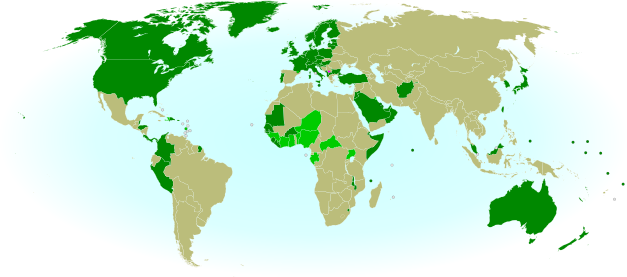 |
| Countries recognizing the Republic of Kosovo in green, with the most recent, Chad, in lighter green (click to enlarge). Kosovo in magenta. Map by Evan Centanni, modified from public domain wiki map (source). |
Showing posts with label europe. Show all posts
Showing posts with label europe. Show all posts
Thursday, June 21, 2012
Kosovo Recognized by Chad (Total: 91/193)
Wednesday, May 2, 2012
Kosovo Recognition Update (Total: 90/193)
Country Name: Kosovo (English, Serbian), Kosova (Albanian)
Official Name: Republic of Kosovo (English), Republika e Kosovës (Albanian),
Republika Kosovo (Serbian)
News Categories: Recognition, Partially Recognized States, Breakaway States
Full Story: See Kosovo Diplomatic Recognition Continues
Official Name: Republic of Kosovo (English), Republika e Kosovës (Albanian),
Republika Kosovo (Serbian)
News Categories: Recognition, Partially Recognized States, Breakaway States
Full Story: See Kosovo Diplomatic Recognition Continues
 |
| Countries recognizing the Republic of Kosovo in green, with arrows marking the two most recent: São Tomé and Príncipe (left) and Brunei (right). Kosovo in magenta. Modified from public domain wiki map (source). |
Thursday, March 15, 2012
Kosovo Diplomatic Recognition Continues
Country Name: Kosovo (English, Serbian), Kosova (Albanian)
Official Name: Republic of Kosovo (English), Republika e Kosovës (Albanian),
Republika Kosovo (Serbian)
News Categories: Recognition, Partially Recognized States, Breakaway States
Summary: The Republic of Kosovo has continued to receive diplomatic recognition from other countries, despite widespread opposition to its 2008 declaration of independence from Serbia. Thirteen more U.N. members have declared their recognition of independent Kosovo just within the last year.
Full Story
The majority of recently independent countries, such as South Sudan and Montenegro, enjoy unopposed recognition from the U.N. and its members. However, acceptance into the international community doesn't always come so easily. Kosovo is one example: because it declared its independence without first coming to an agreement with its former host country (unlike South Sudan and Montenegro), it has struggled to gain acceptance as a sovereign state. The last of the Balkan countries to declare independence after the breakup of Yugoslavia in the 1990s, Kosovo was first separated unofficially from the country in 1999, when NATO intervened militarily in the province to stop Serbian government violence against ethnic Albanians. The Albanians are a cultural group from southeastern Europe who speak a unique language only distantly related to other European tongues, and like the Bosniaks in nearby Bosnia & Herzegovia, are one of the few majority-Muslim European peoples. They also form a majority of the population in the neighboring country of Albania.
Policed by a U.N. peacekeeping mission since 1999, most of Kosovo has never since been controlled by the Yugoslav (now Serbian) government, though the U.N. still officially considers it to be a province of Serbia. Despite fierce political opposition from Serbia, Russia, and other countries, as well as from the ethnic Serb minority within Kosovo, the local government declared independence in 2008. The self-proclaimed Republic of Kosovo government has since administered the territory alongside the U.N. and another police force sent by the European Union, though the Northern Kosovo area, a Serb-majority region, has resisted independence and continues to support the Serbian government in Belgrade, even setting up roadblocks to keep out the Kosovan police - a sort of breakaway state within a breakaway state.
The Republic of Kosovo has not been admitted into the U.N., and it is recognized by only 88 U.N. member countries (many of them NATO members or countries with Muslim populations) and one other state (Taiwan). Serbia and Russia still strongly oppose independence for Kosovo, but the list of states recognizing its sovereignty has nevertheless continued to grow. Within the last year, 13 more U.N. members have offered diplomatic recognition of Kosovan independence: Andorra, the Central African Republic, Guinea, Niger, Benin, Saint Lucia, Nigeria, Gabon, Ivory Coast, Kuwait, Uganda, Ghana, and Haiti.
Sources: See citations on Wikipedia's list of Entities that recognize Kosovo as an independent state.
Official Name: Republic of Kosovo (English), Republika e Kosovës (Albanian),
Republika Kosovo (Serbian)
News Categories: Recognition, Partially Recognized States, Breakaway States
Summary: The Republic of Kosovo has continued to receive diplomatic recognition from other countries, despite widespread opposition to its 2008 declaration of independence from Serbia. Thirteen more U.N. members have declared their recognition of independent Kosovo just within the last year.
 |
| Flag of the Republic of Kosovo. Image by Cradel (source). License: CC BY-SA |
The majority of recently independent countries, such as South Sudan and Montenegro, enjoy unopposed recognition from the U.N. and its members. However, acceptance into the international community doesn't always come so easily. Kosovo is one example: because it declared its independence without first coming to an agreement with its former host country (unlike South Sudan and Montenegro), it has struggled to gain acceptance as a sovereign state. The last of the Balkan countries to declare independence after the breakup of Yugoslavia in the 1990s, Kosovo was first separated unofficially from the country in 1999, when NATO intervened militarily in the province to stop Serbian government violence against ethnic Albanians. The Albanians are a cultural group from southeastern Europe who speak a unique language only distantly related to other European tongues, and like the Bosniaks in nearby Bosnia & Herzegovia, are one of the few majority-Muslim European peoples. They also form a majority of the population in the neighboring country of Albania.
 |
| Kosovo, claimed as a province of Serbia, is policed by U.N. and E.U. peacekeepers. The Republic of Kosovo also governs the region, except for the Serbian-loyalist north. Map is my own work, based on these two blank maps by Nord-NordWest. License: CC BY-SA |
The Republic of Kosovo has not been admitted into the U.N., and it is recognized by only 88 U.N. member countries (many of them NATO members or countries with Muslim populations) and one other state (Taiwan). Serbia and Russia still strongly oppose independence for Kosovo, but the list of states recognizing its sovereignty has nevertheless continued to grow. Within the last year, 13 more U.N. members have offered diplomatic recognition of Kosovan independence: Andorra, the Central African Republic, Guinea, Niger, Benin, Saint Lucia, Nigeria, Gabon, Ivory Coast, Kuwait, Uganda, Ghana, and Haiti.
 |
| Diplomatic recognition of the Republic of Kosovo. Countries that recognized Kosovan independence recently (in the last twelve months) in light green, others in dark green; Kosovo in magenta. Public domain (source). |
Sunday, January 22, 2012
Hungary Shortens Official Name
Country Name: Hungary (English), Magyarország (Hungarian)
News Category: Name Changes
Summary: Hungary's full official name changed from "Republic of Hungary" to just "Hungary" when a new constitution came into effect in the Central European country at the beginning of this year.
Full Story
A member of the Soviet-influenced Eastern Bloc during the Cold War, Hungary was one of the many European countries that underwent major reforms after the fall of the Iron Curtain in 1989. Its name was changed from "People's Republic of Hungary" to "Republic of Hungary", and the old communist constitution was heavily amended to welcome in democracy.
News Category: Name Changes
Summary: Hungary's full official name changed from "Republic of Hungary" to just "Hungary" when a new constitution came into effect in the Central European country at the beginning of this year.
Full Story
 |
| Map of Hungary from the CIA World Factbook (public domain) |
Wednesday, December 21, 2011
WTO Admits New Members
Organization: World Trade Organization
Countries in Question: Vanuatu, Russia, Montenegro, Samoa
News Categories: Intergovernmental Organizations
Summary: The World Trade Organization, the intergovernmental organization supervising international trade between the majority of the world's countries, admitted one new member last October, and three more last week. Especially notable was the admission last Friday of Russia, which was by far the largest economy not to have joined previously.
Full Story
While some intergovernmental organizations, such as the U.N. or regional unions, were created for general purposes of cooperation between states, others serve more specific purposes. The World Trade Organization (WTO) is one of these, acting as a venue for countries to agree on rules for international trade. Among its members, economic agreements are subject to rules aimed at liberalizing international trade, and trade-related disputes are also arbitrated through the organization. Formed in 1995 as a replacement for weaker trade treaties of the past, by 2008 the WTO represented approximately 80% of the world's independent countries.
This October, the WTO grew for the first time in three years, with the acceptance of the Pacific island country of Vanuatu's as a member. Just last week, three more countries joined: Russia, Montenegro, and Samoa. Samoa is another small Pacific island country, and Montenegro was only formed a few years ago from the final breakup of former Yugoslavia. Russia, however, has gained much attention for being the last of the world's major economic powers to join the organization. Although it first applied for admission to the group 18 years ago, before the modern WTO was even formed, until recently Russia was slow to proceed with membership negotiations. For the last few years, it was blocked from entry by Georgia, a WTO member protesting its invasion by Russia during the 2008 war between the two countries, but that hurdle was finally crossed after a Swiss-brokered agreement between Russia and Georgia earlier this year. Although the four new countries have been accepted by the organization, their governments will still have to ratify the agreements in order for them to become full participating members.
Countries in Question: Vanuatu, Russia, Montenegro, Samoa
News Categories: Intergovernmental Organizations
Summary: The World Trade Organization, the intergovernmental organization supervising international trade between the majority of the world's countries, admitted one new member last October, and three more last week. Especially notable was the admission last Friday of Russia, which was by far the largest economy not to have joined previously.
Full Story
While some intergovernmental organizations, such as the U.N. or regional unions, were created for general purposes of cooperation between states, others serve more specific purposes. The World Trade Organization (WTO) is one of these, acting as a venue for countries to agree on rules for international trade. Among its members, economic agreements are subject to rules aimed at liberalizing international trade, and trade-related disputes are also arbitrated through the organization. Formed in 1995 as a replacement for weaker trade treaties of the past, by 2008 the WTO represented approximately 80% of the world's independent countries.
 |
| World Trade Organization members in green. Countries joining this year in brighter green, with small countries circled. Modified from this Wikimedia map (license: CC BY-SA). |
This October, the WTO grew for the first time in three years, with the acceptance of the Pacific island country of Vanuatu's as a member. Just last week, three more countries joined: Russia, Montenegro, and Samoa. Samoa is another small Pacific island country, and Montenegro was only formed a few years ago from the final breakup of former Yugoslavia. Russia, however, has gained much attention for being the last of the world's major economic powers to join the organization. Although it first applied for admission to the group 18 years ago, before the modern WTO was even formed, until recently Russia was slow to proceed with membership negotiations. For the last few years, it was blocked from entry by Georgia, a WTO member protesting its invasion by Russia during the 2008 war between the two countries, but that hurdle was finally crossed after a Swiss-brokered agreement between Russia and Georgia earlier this year. Although the four new countries have been accepted by the organization, their governments will still have to ratify the agreements in order for them to become full participating members.
Subscribe to:
Posts (Atom)
